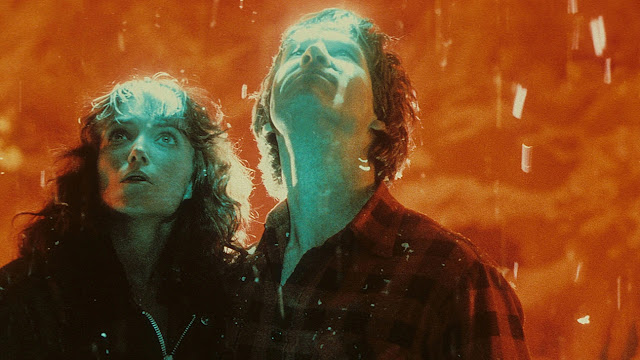STARMAN: When John Carpenter Plays Nice
How one of the most non-Carpenter films is one of the best showcases of the filmmaker's talents.
By: Josh McCormack
John Carpenter isn’t a softie.
Never one to mince words or offer a slight jab at fellow esteemed filmmakers of his time (once even calling the films of Robert Altman “masturbatory”), the director’s films often reflect that angst he has exuded in interviews or talks in public forums. While not quite crossing the threshold of trashy 70s exploitation films, movies like Assault on Precinct 13 or the iconic Halloween are blunt, stripped down, effective genre films that often feel weaponized by Carpenter’s insistence to shock rather than provoke. Not that his films are free of provocation by academics or astute filmgoers–as he is one of my favorite directors whose work I could find countless ways to dissect or over analyze–but Carpenter has made a point of delivering the audience exactly what they came to see and to deliver it in a better package than any of his peers could provide. Any form of pretension (which he despises) or sentimentality (which he loathes) are thrown by the wayside in an attempt to present the audience with an assault of action and terror. And for the most part, audiences of the late 1970s and first couple years of the 1980s were on board with this and studios let him run amok.
But in 1982, John Carpenter was in trouble.
The Thing–his now beloved remake of the Howard Hawk’s produced 1951 film–was not only a box office bomb in the summer of ‘82, but was targeted by critics and audiences as a reprehensible piece of cinema. Called “instant junk” by then New York Times critic, Vincent Canby, the film’s reception was an all-around disaster. Carpenter, who not only lost money on the film, but also prospective projects such as the adaptation of Stephen King’s Firestarter, was practically blacklisted from Hollywood, outside of being thrown a bone by King himself, which allowed him to direct the adaptation of Christine in 1983. While that film was a modest success, Carpenter knew he would have to try quite hard to get back on the filmgoing public’s good side.
Enter 1984’s Starman. A film that, on paper, has so many of the elements Carpenter despises. A sappy love story, pretentious monologues about how humanity can be good, and an aesthetic and narrative kinship to Steven Spielberg’s E.T. The Extra Terrestrial. That film 's success (merely two weeks prior to the release of The Thing) has been cited by Carpenter as one of the reasons audiences didn’t want to see a malevolent alien force in The Thing. For all these reasons, John Carpenter seems like the last person who would be attached to this project.
But indeed he was. And having just revisited Starman with my wife in a movie theater a couple days back, as well as introducing her to The Thing just a few weeks prior, I was truly amazed at how opposite the films are when viewed back-to-back. Aside from the obvious jumping ship from a “bad alien” movie to a “good alien” movie, the overall tone of Starman and its profound optimism is at odds with so much of not only The Thing, but the majority of Carpenter’s work, even up to his most recent film, 2010’s The Ward.
Where Carpenter has become famous for the claustrophobia that his films up to this point captured, Starman is a cross-country road trip. Where the filmmaker often revels in not giving any explanation to the otherworldly or supernatural in his films, Starman revels in 50’s B-movie levels of exposition from its government subplot (admittedly the weakest element of the movie). And where Carpenter has often shown his disdain for humanity and especially our governing bodies, Starman is a shockingly hopeful movie that even features our main alien protagonist–played incredibly by Jeff Bridges–saying that humanity is “at its best, even when things are at their worst”. Starman is at odds with its director, and while the filmmaker himself has called himself an “optimist” in a recent interview with The Ringer film podcast, it’s incredibly hard to fathom that the guy who would cynically disavow the unchecked capitalism of Reagan’s America a mere four years later with They Live, would still make something that is somehow wholesome.
And yet, I think Starman is a perfect encapsulation of why Carpenter is an amazing filmmaker. All of these cinematic clichés that are saccharine to the grizzled master of horror are still handled incredibly well and the way Carpenter works with actors (one of his most underrated directorial attributes) makes even the most sappy sequence bearable. Much has been said and written about Bridges’ iconic performance as the titular Starman–an alien inhabiting the body of a recently deceased husband, but it’s really Karen Allen who wows me the most as Jenny Hayden. Her story of grief and Allen's reserved, emotional performance is just so beautiful and what holds the movie together. I still tear up on that final shot of the film, which is just an unbroken take of her face watching the ascending starship.
Starman might not be one of Carpenter’s best or most anarchic films, but it’s an incredible showcase of how–even when making a movie that is far more for an audience than the artist himself–he’s more than just a master of horror, he’s a master of filmmaking.



Comments
Post a Comment